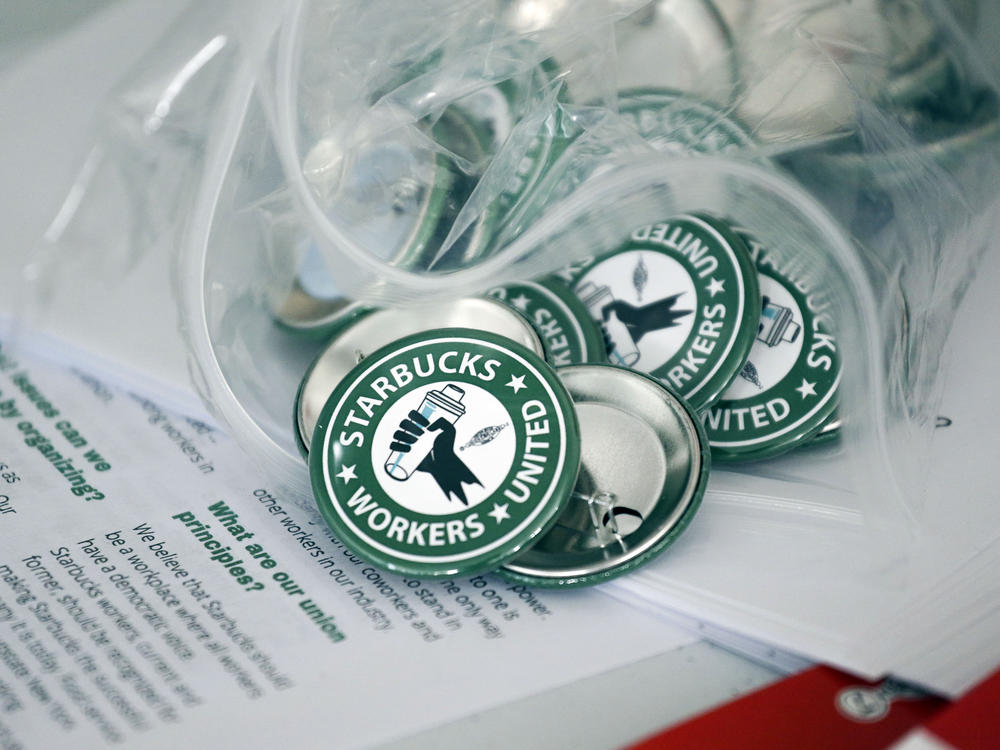Section Branding
Header Content
Starbucks fired 7 union organizers. The government wants a court to reinstate them
Primary Content
The National Labor Relations Board is asking a court to reinstate seven Starbucks workers who were allegedly fired illegally because they were involved in union organizing.
If approved by a judge, the NLRB filing would allow the former Starbucks employees, who worked at multiple Buffalo, N.Y. locations, to return to work while anti-union allegations against Starbucks are heard in court, a process that can take months. The case is set to be heard on July 11.
The workers claim they were singled out on the job by Starbucks managers. One former employee, Angel Krempa, said she was fired after a series of "targeted attacks" once her store's management realized she was involved in union organizing. She says that when she was hired, her manager at the time told her that the multiple nose piercings and suicide prevention pin she wore to work every day were fine. But a new manager who started in January, after the union drive began, took issue with the piercings and pin. Krempa says she was asked to remove them and refused. The Starbucks handbook for employees says that the only pins allowed are union ones.
Before she was fired, Krempa says she got multiple written warnings for refusing to take out one of her piercings or remove the pin. She also got a warning once for missing work because her car wouldn't start. She said her managers claimed she didn't inform the store she would be absent. Krempa said she called her manager to let them know she was trying to catch a ride.
Krempa thinks the disciplinary actions were motivated by her advocating for a union, and she's confident the judge will see it that way too.
"I don't think that we're going to lose either of these next two trials," Krempa said, referring to both the filing to immediately reinstate her and the other workers and the July 11 hearing about Starbucks' alleged unfair labor practices.
Krempa's Starbucks location voted to unionize on March 23. She was fired on April 1.
Starbucks denies any anti-union allegations. "As we have said previously, we believe these claims are false and will be prepared to defend our case," Reggie Borges, a Starbucks spokesperson, said in an email to NPR.
In order to tamp down unionization efforts at multiple Buffalo Starbucks locations, the company raised wages and promised improvements such as centralized training and store renovations, according to court documents. CEO Howard Schultz said in May that all Starbucks employees were getting new benefits — including expanded training, improved sick leave and credit card tipping — but that stores with active union efforts would be excluded.
The corporation also sent managers to discourage union activity and closed stores with active union drives, an NLRB spokesperson said.
The recent filing could have effects across the country. If the judge rules in favor of the NLRB, Starbucks would have to immediately stop the alleged anti-union activity at all stores. It would also be required to recognize and bargain with the Starbucks Workers United union. The NLRB is trying to get an immediate stop to what it says are unfair labor practices because waiting for the case to be heard in court would take too long to remedy the violations.
A Starbucks in Buffalo was the first location in the chain to unionize in December, beginning a significant wave of organizing at the coffee corporation's stores. Since then, more than 160 Starbucks stores have voted to unionize, and 27 have voted against it, according to NLRB figures.
The NLRB region that covers much of New York, including Buffalo, has filed a complaint with more than 200 allegations of unfair labor practices by Starbucks.
The NLRB filed similar claims to reinstate Starbucks workers in Memphis, Tenn., and Phoenix. The Memphis case is ongoing and the Phoenix claim was denied by a judge earlier this month.
Copyright 2022 NPR. To see more, visit https://www.npr.org.

